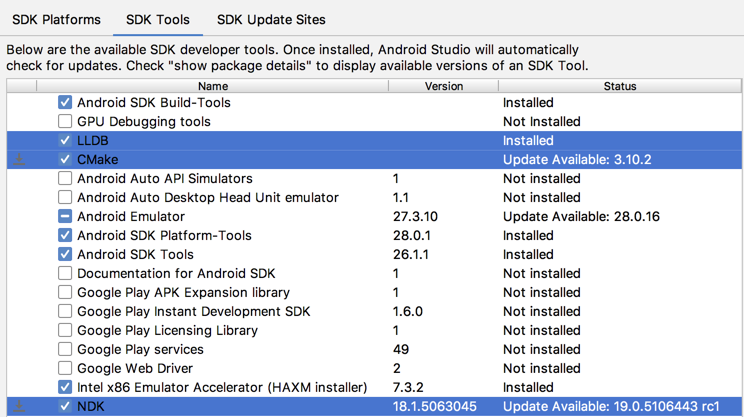


Which has a single parameter, the class name and package, with the path divided by ”/”. The following are off-topic: - anything not related to Android NDK. Jclass cls = env ->FindClass ( "com/example/user/test/MainActivity" ) android-ndk is for technical discussion of Android NDK. In this case, the method takes no parameters ”()” and returns void “V”. Where cls is the class the method is part of, the first string is the method name and the second string is a method signature. JmethodID mID = env ->GetMethodID (cls, "setText", "()V" )
#Android ndk install#
The Void in the name suggests that the method returns void. You should use the Unity Hub to install Android SDK & NDK tools and OpenJDK to ensure that you receive the correct versions and configurations. Where obj is the object you want to call the method on and mID is the method ID.
#Android ndk archive#
The tasks in the archive are numbered from 1 through 8, but they correspond to tasks 3 through 10.įor the first task you have to call the setText() method from native code. The NDK allows Android application developers to include native code in their Android application packages, compiled as JNI shared libraries. Each of them correspond to a task, in order. You will notice there are 8 buttons, each with a TextView associated. Then, export the prefab: Notes: The -prefab-maven flag is optional. Then, make sure your activity has a TextView (with an id to reference it), and at onCreate, set the TextView to the String returned by getString().ĭownload the lab archive and import the project into Android Studio ( File > New > Import Project). First, 'vcpkg install' the 4 android architectures (it is mandatory to export all 4 of them): Console./vcpkg install jsoncpp:arm-android jsoncpp:arm64-android jsoncpp:圆4-android jsoncpp:x86-android. Jstring Java_com_example_user_nativeapplication_MainActivity_getString (JNIEnv *env, jobject instance ) private native String getString ( ) You can find more information about NDK integration in Android Studio at this link.Įdit native.cpp and add the following function: You should use this whenever a new project is required. In your case 669 means that you have Android NDK r21 (January 2020). Because NDK is not fully support on Android Studio yet, you will have to import the project from this archive: introapplication.zip


 0 kommentar(er)
0 kommentar(er)
